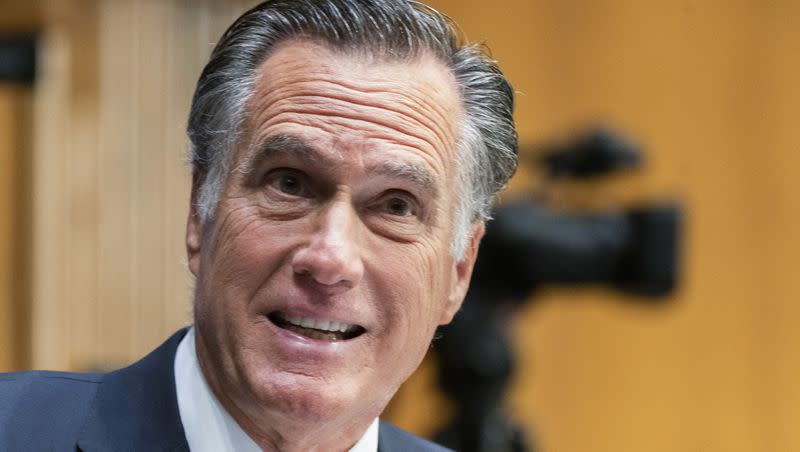Mitt Romney presses White House for China policy while administration extends olive branch

Utah Sen. Mitt Romney said Tuesday he wants the Biden administration to take a more holistic approach in its policy toward China, while on the same day the U.S. ambassador to China seemed to hold out an olive branch to officials there.
A February trip to China by Secretary of State Antony Blinken was canceled after a so-called “Chinese spy balloon” floated into U.S. airspace. At an event Tuesday, Ambassador Nicholas Burns said U.S. officials are “ready to talk.”
“We’ve never been shy of talking, and we hope the Chinese will meet us halfway on this,” he said, speaking at the Stimson Center.
Meanwhile, at a Senate Foreign Relations Subcommittee hearing Tuesday, Romney, as ranking member, said there is “broad agreement” about the challenges faced by the U.S. with its foreign policy toward China, especially due to the country’s “emergence as a great power.”
“During the Cold War, Presidents Ford and Eisenhower and Reagan directed similar undertakings as we confronted the Soviet Union. And I believe we should carry out the same type of strategic effort with regard to China,” Romney said.
“But I’m concerned that the administration is sort of hoping this will go away or that a speech of grand principles will suffice,” he added.
Three buzzwords in a public speech are not sufficient to address the growing threat China poses to the global order and freedom. The Administration must—by law—expand beyond words and develop a comprehensive China strategy with deep, granular, and tactical objectives. pic.twitter.com/mExBKsXlPG
— Senator Mitt Romney (@SenatorRomney) May 2, 2023
Last year, Romney, along with other lawmakers, passed legislation that required the administration to develop a comprehensive strategy on China. He took the opportunity at the hearing to check on the White House’s progress.
White House’s progress on the National Defense Authorization Act
China has developed programs to improve its access to talent, raw materials, intellectual property and trade agreements, and to develop relationships in Africa and Latin America, Romney said in his opening remarks.
Related
“And one of the most troubling aspects of their strategy is their effort to live by different trade rules than the rest of the nations live by, monopolizing certain industries, predatory pricing to achieve that monopoly, establishing pathways around the national trade rules,” the Utah senator said, adding that he is anxious to hear the administration’s plan.
The Utah senator, along with fellow Republican Sen. Jim Risch of Idaho, sent President Joe Biden a letter in November, asking his administration to give an update on the progress within 60 days of receiving the letter. Romney followed up on the letter during the line of questioning.
One of the witnesses at the hearing, Daniel J. Kritenbrink, a State Department official, said the Biden administration will reveal its new policy related to China in the coming weeks.
Foreign policy implications from war in Ukraine
Kritenbrink said that the administration has expressed “deep concern” about China supporting Russia in the war in Ukraine, adding that they have made it clear that China will face consequences if it were to provide Russia with assistance.
“In the context of Taiwan, we have continued to signal that there is no change to our longstanding One China policy,” he added. “That framework has helped maintain peace and stability across the Taiwan Strait for more than four decades now.”
What did Sen. Romney say about Taiwan?
On Taiwan, Romney spoke of the fear that emerged after Russia invaded Ukraine that it would embolden China.
But, he said, “I was of the view that it was unlikely that China would immediately invade Taiwan.”
Romney said he thought Taiwan’s globally essential technology industry would provide a deterrence against an invasion by China.
“My hope and belief that the extraordinary proprietary capabilities that Taiwan has will serve as perhaps one of the most effective deterrence to keep China from carrying out kinetic activity,” Romney said.

